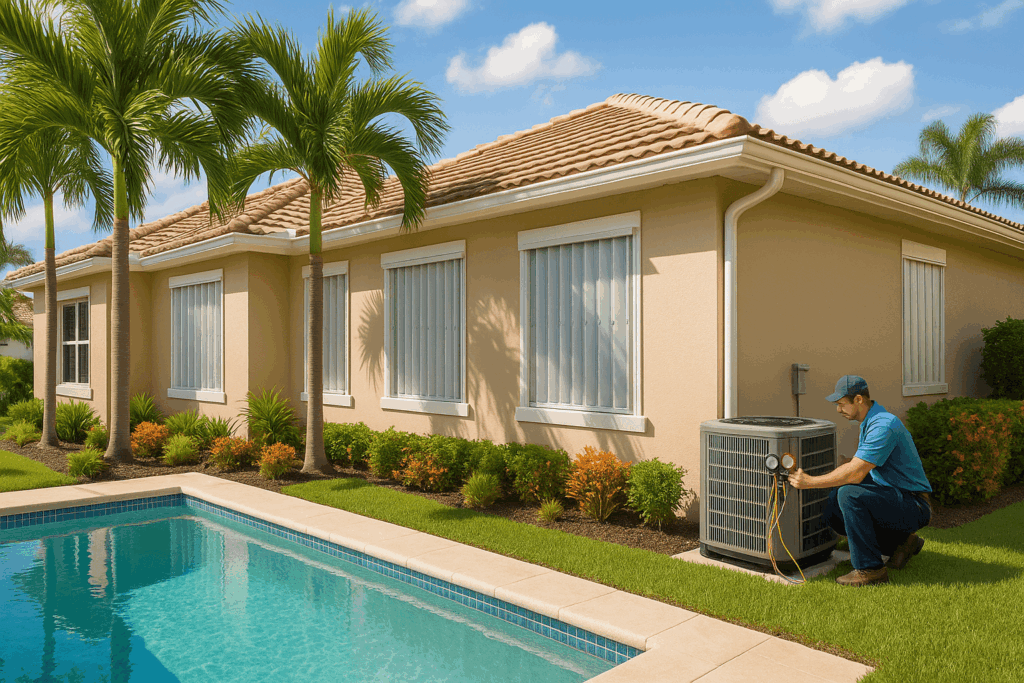
Florida Summer Property Maintenance Checklist: Essential Tasks for Heat and Humidity Protection
Summer in Florida demands specific property maintenance due to high heat, humidity, frequent storms, and the threat of hurricanes. Homes in the region face challenges like moisture buildup, wear from salt air, and heavy use of air conditioning systems. Being proactive during this season helps protect the property and prevent costly repairs.
A summer property maintenance checklist for Florida should focus on HVAC servicing, moisture control, storm preparedness, and regular safety inspections to keep the home in good shape. These tasks are essential to managing Florida’s unique climate effects and ensuring the property remains functional and comfortable throughout the summer months.
Owners who follow a clear plan for upkeep can improve energy efficiency, avoid water damage, and strengthen their home against severe weather. Regular maintenance not only secures the home’s condition but also extends the life of key systems and structural elements.
Why Summer Property Maintenance Is Essential in Florida
Summer maintenance protects properties from Florida’s extreme climate effects and natural threats. It preserves property value through appearance and functionality, addressing challenges unique to this season.
Protecting Against Heat and Humidity
Florida summers bring intense heat and high humidity, which can accelerate wear on a property. Air conditioning systems work harder, increasing the risk of breakdowns without regular servicing. Inspecting and cleaning HVAC units ensures efficient cooling and helps avoid costly repairs.
Humidity encourages mold and mildew growth, especially in poorly ventilated areas. Homeowners should check for damp spots and address leaks promptly. This prevents structural damage and health risks tied to mold exposure.
Routine maintenance also includes sealing cracks and gaps to reduce heat infiltration and moisture entry. Proper insulation and weatherproofing improve energy efficiency, lowering utility bills during peak summer temperatures.
Prevention of Storm and Hurricane Damage
Summer is hurricane season in Florida, making storm preparedness critical. Routine checks of roofing, gutters, and windows reduce vulnerabilities. Loose shingles, clogged gutters, and weak window seals are common damage points during storms.
Securing outdoor structures and removing debris minimizes hazards from high winds and flying objects. Property owners should trim trees and secure or store furniture and equipment.
Installing or maintaining hurricane shutters and ensuring proper drainage systems helps protect foundations from flooding. Planning and timely repairs before a storm reduce both immediate and long-term damage costs.
Enhancing Curb Appeal
Summer maintenance also improves a property’s exterior appearance, which affects both property value and neighborhood aesthetics. Regular power washing removes mold and mildew stains common in Florida’s humid climate.
Painting or touching up exterior surfaces protects against sun damage and keeps homes looking fresh. Landscaping upkeep, such as mowing, trimming, and watering, supports healthy plant growth despite dry spells.
A well-maintained exterior signals pride of ownership and can deter pests attracted by overgrowth or neglect. These efforts contribute to a property’s attractiveness and overall marketability during and after summer.
Exterior Home Inspection and Repairs
Thoroughly inspecting the home’s exterior and addressing any damage is essential during Florida summers. Heat, heavy rains, and hurricane season demand careful attention to structural elements and moisture barriers to maintain property integrity.
Roof Assessment and Gutter Cleaning
The roof should be examined for missing, cracked, or loose shingles, as these can cause leaks during summer storms. Attention to flashing around chimneys and vents is critical to prevent water intrusion.
Gutters must be cleared of leaves, debris, and blockages to ensure proper water drainage. Clogged gutters can lead to water damage on walls and foundations. Inspect gutter attachments for stability and repair any sagging sections.
Regularly checking for signs of algae or moss helps protect roofing materials. Removing buildup early extends roof lifespan and prevents costly repairs.
Windows, Doors, and Seals Check
Windows and doors require inspection for cracks, gaps, or deteriorated weatherstripping that may let in moisture or let cooled air escape. Ensuring tight seals improves energy efficiency during Florida’s hot months.
Check window screens for tears or holes to keep insects out. Replace damaged screens promptly to reduce pest intrusion risks common in the summer.
Lubricating door hinges and locks prevents sticking and ensures secure closure. Properly functioning seals also help prevent water entry during heavy rains.
Siding and Paint Maintenance
Examine siding for cracks, warping, or loose panels that could expose the home to moisture damage. Prompt repair of damaged siding minimizes risks of mold and rot.
Inspect the paint for peeling or blistering to maintain the protective barrier against sun and rain. Touch up or repaint areas showing wear, especially on surfaces exposed to direct sunlight.
Cleaning siding with a mild detergent removes dirt and mildew. This maintenance prolongs the material’s durability and preserves curb appeal during the harsh summer climate.
Air Conditioning and Cooling Systems
Maintaining air conditioning systems is critical in Florida’s hot and humid climate. Proper attention ensures efficient cooling, reduces energy bills, and minimizes the risk of breakdowns during peak summer heat. Key actions include regular professional maintenance, timely filter changes, and optimizing thermostat settings.
Professional HVAC Maintenance
A professional HVAC inspection and tune-up should be conducted annually, ideally before summer begins. Technicians check refrigerant levels, clean coils, inspect electrical connections, and test the system’s performance. This prevents potential failures caused by wear or dirt buildup.
Ignoring regular service can cause the system to work harder, increasing energy consumption and accelerating component wear. In Florida, the heavy demand on air conditioners makes professional maintenance especially important to sustain efficiency and reliability throughout the extended cooling season.
Filter Replacement
Replacing or cleaning air filters every 1 to 3 months is essential. Dirty filters restrict airflow, forcing the system to run longer and use more energy. This also reduces indoor air quality by allowing dust and allergens to circulate.
Types of filters vary, but all should be routinely checked. High-efficiency particulate air (HEPA) filters or those with a higher MERV rating provide better filtration but may require more frequent replacement. Maintaining clean filters helps extend the lifespan of the AC unit and improves overall performance.
Thermostat Settings Optimization
Proper thermostat settings reduce strain on cooling systems and save energy. Setting the thermostat to around 78°F when occupants are home balances comfort and efficiency. Raising the temperature by several degrees when the home is empty can significantly lower cooling costs.
Using programmable or smart thermostats can automate temperature adjustments based on schedules or occupancy. This leads to more consistent cooling, prevents unnecessary operation, and ensures the system only runs as needed.
Yard and Landscape Management
Maintaining a healthy yard in Florida’s summer requires consistent attention to soil nutrients, plant health, and pest prevention. Proper watering, pruning, and pest control will help keep the landscape resilient during peak heat and humidity.
Lawn Care and Fertilization
Frequent mowing is essential, ideally keeping grass heights between 2 to 3 inches to reduce stress from heat. Using a mulching mower can help recycle nutrients back into the soil.
Fertilization should focus on slow-release nitrogen applied every 6 to 8 weeks, avoiding heavy feeding during extreme heat to prevent burning. Water the lawn early morning or late evening to reduce evaporation and support nutrient uptake.
Irrigation should be deep but infrequent, about 1 inch per week, adjusted according to rainfall. Automated sprinkler systems with timers can improve watering efficiency.
Tree and Shrub Trimming
Pruning should focus on removing dead or diseased branches to improve airflow and reduce pest risk. Avoid heavy trimming during extreme heat, which can further stress plants.
Maintaining a balanced canopy helps shade the root zone and conserve moisture. Shearing hedges lightly encourages denser growth but should be done with care to avoid cutting into old wood.
Regular inspection for signs of disease or infestation is important. Use clean, sharp tools to prevent damage and spread of pathogens.
Pest and Weed Control
Early identification and control of common summer pests like chinch bugs, aphids, and whiteflies are crucial. Integrated pest management strategies using both chemical and biological controls can effectively reduce infestations.
Pre-emergent herbicides applied in late spring can limit weed growth throughout summer. Manual removal of weeds around vulnerable plants also helps prevent spread.
Monitoring irrigation zones for standing water reduces mosquito breeding areas. Keeping yard debris cleared will minimize potential pest habitats.
Pool and Outdoor Living Areas
Maintaining pool and outdoor living spaces during Florida’s summer requires consistent attention to safety, cleanliness, and protection from the elements. Proper upkeep extends the life of equipment, prevents health risks, and preserves the usability of outdoor areas.
Pool Cleaning and Chemical Balancing
Pools should be cleaned thoroughly at the start of summer, especially if winterized. This involves scrubbing surfaces, removing debris, and vacuuming the pool floor. Pumps and filters must be inspected to ensure they operate efficiently without blockages or damage.
Chemical levels are critical for swimmer safety and equipment preservation. Weekly testing of pH, chlorine, alkalinity, and calcium hardness is essential. Adjustments should be made promptly to keep the pool water balanced, preventing algae growth and corrosion. Safety checks of fences, gates, and flotation devices are also necessary to comply with Florida regulations.
Deck and Patio Cleaning
Decks and patios endure heavy use during summer and are exposed to dirt, pollen, and moisture. Regular sweeping removes loose debris, while power washing eliminates mildew and stains from wood or concrete surfaces. Inspections should focus on structural integrity, including loose boards, cracks, or areas vulnerable to water damage.
Applying a water-repellent sealant can extend the lifespan of wooden decks and prevent splintering. For concrete or stone finishes, cleaning agents suitable for the material type help maintain appearance without damaging the surface. Ensuring these areas are slip-resistant reduces accident risks in wet conditions.
Outdoor Furniture Protection
Outdoor furniture requires protection from sun exposure, humidity, and rain typical in Florida summers. Regular cleaning of cushions and frames prevents mold and discoloration. Use mild soap solutions for most materials and rinse thoroughly to avoid residue buildup.
Applying fabric protectors or UV-resistant sprays extends the life of cushions and upholstery. When not in use, storing furniture in shaded or covered areas minimizes deterioration. Covering metal or wooden pieces with weatherproof covers helps prevent rust, warping, and cracking caused by prolonged exposure to heat and moisture.
Humidity and Mold Prevention
Controlling moisture and humidity is critical in Florida’s summer climate to prevent mold growth. Proper ventilation, regular equipment maintenance, and thorough moisture inspections help keep indoor air dry and reduce the risks associated with damp environments.
Dehumidifier Usage and Maintenance
Dehumidifiers reduce indoor humidity levels, making them essential during Florida’s humid summers. They should be set to maintain indoor relative humidity between 45-55%, which limits mold growth without making the air uncomfortably dry.
Regular maintenance includes cleaning or replacing filters every one to three months. The water collection bucket must be emptied daily or connected to a drain line to prevent overflow. It’s important to inspect the unit for dust buildup and clean coils annually to maintain efficiency. Ensuring proper sizing of the dehumidifier based on room square footage boosts performance and energy efficiency.
Bathroom and Kitchen Ventilation
Bathrooms and kitchens generate significant moisture, making effective ventilation necessary to prevent mold. Exhaust fans should vent directly outdoors, not into attics or crawl spaces.
Fans must be rated for the size of the room and used during and after activities like showers or cooking. Annual cleaning of fan grills and ductwork reduces dust buildup that can obstruct airflow. Installing timers or humidity sensors on fans can automate operation, ensuring consistent moisture removal.
Moisture Inspection in Crawl Spaces
Crawl spaces are prone to moisture accumulation due to poor ventilation and ground humidity, which promote mold and wood rot. Regular inspections, especially after heavy rains, are crucial.
Look for standing water, damp insulation, or musty odors. Installing vapor barriers on the ground limits moisture intrusion. Proper vent placement or installing a dehumidifier designed for crawl spaces further reduces humidity. Addressing drainage and grading issues around the foundation improves long-term moisture control.
Plumbing and Water Systems Check
Proper maintenance of plumbing and water systems is crucial for Florida homes during summer. Attention to outdoor water points and early leak detection can prevent costly repairs and water waste. Homeowners should focus on inspecting faucets and hoses and identifying any signs of leakage inside and outside the house.
Outdoor Faucet and Hose Inspection
Outdoor faucets must be checked for signs of wear, corrosion, or dripping. Even small drips can increase water bills and encourage mold growth. Hoses should be examined for cracks, leaks, or loose connections.
It is important to ensure hose bibs have functioning shutoff valves to avoid continuous water flow when not in use. Removing and draining hoses before prolonged periods of non-use can prevent damage from pressure buildup.
Homeowners should also verify that hose washers are intact and replace them if hardened or cracked. Regular inspection reduces the risk of water damage to exterior walls and landscaping from undetected hose leaks.
Leak Detection and Repair
Detecting leaks early protects both the plumbing system and property foundation. Checking under sinks, around toilets, and near water heaters for moisture or stains is essential. Visible water marks or damp areas often signal hidden leaks.
Using water meters can help identify leaks by tracking usage when no water is actively being used. A sudden increase may indicate plumbing issues.
If leaks are found, timely repair is critical. This includes tightening fittings, replacing worn-out seals, or consulting a professional plumber for complex problems. Neglecting leaks can result in mold growth, structural damage, and higher utility bills.
Safety Precautions and Emergency Preparedness
Preparing a Florida property for summer involves ensuring access to essential emergency supplies and regularly testing safety devices. This helps protect tenants and reduces risks during extreme weather or other emergencies.
Hurricane Supplies and Equipment
A well-stocked emergency kit is crucial for hurricanes common in Florida. Essential items include bottled water (one gallon per person per day for at least three days), non-perishable food, flashlights, batteries, and a first aid kit. A portable generator is also recommended to maintain power during outages.
Tenants should have a printed list of local emergency contacts and nearby cooling centers. Boarding up windows or installing storm shutters is vital to protect against high winds. Regularly inspect and maintain these protections before hurricane season to ensure readiness.
Smoke and Carbon Monoxide Detector Testing
Smoke and carbon monoxide detectors must be tested monthly to ensure proper function. Replace batteries at least twice a year or immediately if low battery warnings sound.
It’s important to place detectors on every floor and near sleeping areas. Tenants should be reminded how to test devices and what to do if alarms sound, enhancing overall safety. Proper maintenance can prevent fatalities caused by fires or carbon monoxide poisoning.
Regular Maintenance Scheduling
Regular maintenance scheduling is essential during Florida’s summer months due to high humidity, intense heat, and frequent storms. Property managers and homeowners should increase the frequency of checks to prevent damage and ensure systems run efficiently.
Critical tasks include HVAC filter replacements every month and inspecting roofs quarterly for leaks or wear. These steps help maintain air quality and protect the home from storm-related damage.
Landscaping requires more frequent attention as well. Lawns should be mowed regularly, and irrigation systems checked to avoid water waste and to keep plants healthy under the summer sun.
A clear and consistent schedule improves communication with maintenance teams. It also allows for timely repairs before small issues escalate, saving costs in the long run.
Suggested maintenance frequency:
| Task | Frequency | Notes |
| HVAC filter check | Monthly | Ensures cooling efficiency |
| Roofing inspection | Quarterly | Checks for storm damage or deterioration |
| Lawn care | Weekly to Biweekly | Adjust based on growth and rainfall |
| Irrigation system check | Monthly | Prevents water loss and plant stress |
Using a checklist aligned with seasonal challenges simplifies management and prevents oversight during busy summer months.
Protect Your Florida Property All Summer Long with Expert Help from Kanga
Managing a Florida property in the summer isn’t just about keeping it looking good—it’s about defending it from the elements, maintaining safety, and ensuring long-term value. From HVAC tune-ups to hurricane preparedness, every task on this checklist protects your investment from heat, humidity, and storm-related damage.
At Kanga Property Management, we don’t just react—we plan, prevent, and protect. Our experienced team handles seasonal maintenance with precision and care, ensuring your property stays in peak condition all year. Whether it’s organizing roof inspections, managing landscaping, or coordinating emergency preparedness, we take the stress out of summer upkeep.
Trust Kanga to manage your property like it’s our own—efficiently, proactively, and always with your best interest in mind. Reach out today to stay ahead of Florida’s summer challenges with confidence.


